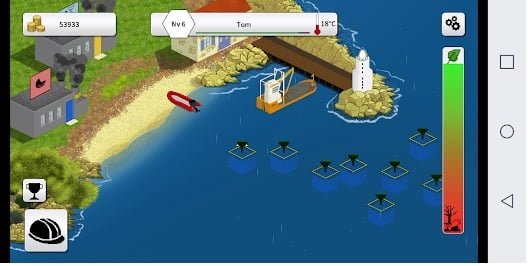In an effort to grow new global interest in aquaculture, two researchers have launched an aquaculture simulation game called, Aquakultor. The game allows users to design and create their own fish farm, stock their cages with a number of fish, rack up cash by harvesting fish and selling cages, and monitor the specific environmental factors of the farm with a sustainability index.
The game was the innovation of two aquaculture genetics researchers from France. Dr. François Allal of the French Research Institute for Exploitation of the Sea and Dr. Mathieu Besson of the National Research Institute of Agronomy were working together and thought they might be able to combine their work in genetics and aquaculture. With the help of their colleagues, the pair was able to secure a grant and enlist the assistance of The One Man Army Game Studio to develop the concept fully.
Aquakultor is a unique gaming experience in that it has an educational and ecological aim, while maintaining the spirit of other popular video games like SimCity™, Theme Hospital, and FarmVille.
“It’s rare that we see games with an ecologically-based message. The game is about optimising your production while reducing its environmental impact. When done right you see an economical return,” Besson said in an interview about Aquakultor with SalmonBusiness.com. “We’ve got a lot of ideas, our only hurdle is time and a budget.”
Checkout Aquakultor for Android or Aquakultor for iOS – both free for users – to get your virtual fish farm started:
https://play.google.com/store/apps/details?id=com.tomagamestudio.aquakultor&hl=en
https://itunes.apple.com/us/app/aquakultor/id1405990965?mt=8
Source: Pentair
Editor at the digital magazine AquaHoy. He holds a degree in Aquaculture Biology from the National University of Santa (UNS) and a Master’s degree in Science and Innovation Management from the Polytechnic University of Valencia, with postgraduate diplomas in Business Innovation and Innovation Management. He possesses extensive experience in the aquaculture and fisheries sector, having led the Fisheries Innovation Unit of the National Program for Innovation in Fisheries and Aquaculture (PNIPA). He has served as a senior consultant in technology watch, an innovation project formulator and advisor, and a lecturer at UNS. He is a member of the Peruvian College of Biologists and was recognized by the World Aquaculture Society (WAS) in 2016 for his contribution to aquaculture.
Stay Always Informed
Join our communities to instantly receive the most important news, reports, and analysis from the aquaculture industry.







